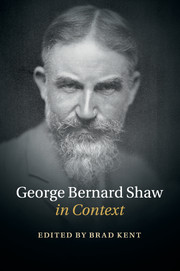Book contents
- Frontmatter
- Dedication
- Contents
- List of illustrations
- Notes on contributors
- Preface
- Acknowledgements
- A Chronology of Shaw's Works
- List of abbreviations
- PART I PEOPLE AND PLACES
- PART II THEATRE
- PART III WRITING AND THE ARTS
- PART IV POLITICS
- PART V CULTURE AND SOCIETY
- 31 Celebrity
- 32 Education
- 33 Evolutionary theory
- 34 Health and vegetarianism
- 35 Language
- 36 Nature
- 37 Philosophy
- PART VI RECEPTION AND AFTERLIFE
- Further reading
- Index
- References
32 - Education
from PART V - CULTURE AND SOCIETY
Published online by Cambridge University Press: 05 October 2015
- Frontmatter
- Dedication
- Contents
- List of illustrations
- Notes on contributors
- Preface
- Acknowledgements
- A Chronology of Shaw's Works
- List of abbreviations
- PART I PEOPLE AND PLACES
- PART II THEATRE
- PART III WRITING AND THE ARTS
- PART IV POLITICS
- PART V CULTURE AND SOCIETY
- 31 Celebrity
- 32 Education
- 33 Evolutionary theory
- 34 Health and vegetarianism
- 35 Language
- 36 Nature
- 37 Philosophy
- PART VI RECEPTION AND AFTERLIFE
- Further reading
- Index
- References
Summary
‘Cognitive domain’, ‘defined outcomes’, ‘quantitative methods’: these clinical terms define much contemporary educational theory, research, and practice. By comparison, Bernard Shaw's far-ranging ideas about education seem irrelevant – almost quaint. An autodidact with a revolutionist's soul and a mystic's idealism, Shaw had no training in classroom management or school administration, and no interest in the number-driven outcomes that shape educational policies and practices in our time.
But perhaps it is modern education that is out of touch with Shaw. His dictums in the Preface to Misalliance that ‘The child at play is noisy and ought to be noisy’ and ‘the child should spend most of its time at play’ (CPP IV: 29) antedate the latest trends in education described by Alison Gopnik in ‘Why Play Is Important’. And Shaw's belief in education as instrument for social change anticipates some of the great educational reformers of modern times. Here, sounding like Shaw, is John Dewey in ‘The School and Social Progress’: ‘What the best and wisest parent wants for his own child, that must the community want for all of its children. Any other ideal for our schools is narrow and unlovely; acted upon, it destroys our democracy’.
Maria Montessori was a physician and early childhood educator whose ideas still influence teaching. In her 1937 address to the Sixth International Montessori Congress, she proclaimed a vision for humanity that sounds positively Shavian: ‘A great social mission that will ensure the child justice, harmony and love remains to be accomplished. And this great task must be the work of education, for this is the only way to build a new world and to bring peace’. Similarly, Lev Vygotsky – like Shaw, thoroughly grounded in Marxist theory – was a revolutionary thinker who saw social reform as the ultimate purpose of education: ‘New generations and new forms of their education represent the main route which history will follow whilst creating the new type of man’.
Vygotsky's interest in ‘creating the new type of man’ echoes Shaw's belief that ‘you cannot have a new sort of world without a new sort of Man’. Like all progressive educators of modern times, Shaw believed that education was an essential tool in the creation of that ‘new sort of world’.
- Type
- Chapter
- Information
- George Bernard Shaw in Context , pp. 265 - 272Publisher: Cambridge University PressPrint publication year: 2015



